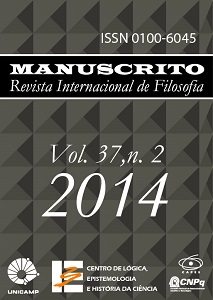Resumo
In this essay I will argue that natural selection is more important to functional explanations than it has been normally thought in some of the literature in philosophy of biology. I start by giving a brief overview of the two paradigms cases of functional explanations: etiological functions and causal-role functions. I then consider one particular attempt to conciliate both perspectives given by David Buller (1998). Buller’s trial to conciliate both etiological functions and causal-role functions results in what he calls a weak etiological theory. I argue that Buller has not succeeded in his construal of the weak etiological theory: he underestimates the role that selective processes have in functional explanations and so his theory may not be classified as an etiologial theory. As an alternative, I consider the account of etiological functions given by Ruth Millikan (1984) and I argue that Millikan’s theory is more comprehensive to assess contentious case in biology like exaptations. Finally, I conclude by analyzing where the adoption of Millikan’s theory leave us. I argue, contrary to Millikan and others, that once we assume the importance of natural selection in functional explanations, there is no strong reason to resist a linguistic reform of the word function and hence that the attempts to conciliate both etiological functions and causal-role functions are misplaced.Referências
ARIEW, A (ed.). Functions. Oxford: Oxford University Press, 2002.
BULLER, D. “Etiological theories of function: a geographical survey”, Biology and Philosophy, 13, pp. 505-527, 1998.
CUMMINS, R. “Functional analysis”. Journal of Philosophy, 72, pp. 741- 765, 1975.
DAVIDSON, D. “Knowing one’s own mind”. Proceedings and Addresses of the American Philosophical Association, 61, pp. 441–458, 1987 DENNETT, D. The intentional stance. Cambridge: MIT Press, 1987.
DRETSKE, F. (1996). Naturalizing the mind. Cambridge: MIT Press, 2007.
GODFREY-SMITH, P. “Functions: consensus without unity”. Pacific Philosophical Quarterly, 74, pp. 196-208, 1993.
GOULD, S. & LEWONTIN, R. “The spandrels of San Marco and the panglossian paradigm: a critique of the adaptationist program”. Proceedings of the Royal Society, London, 205, pp. 581-598, 1979.
GOULD, S. & LEWONTIN, R. and VRBA, E. “Exaptation - a missing term in the science of form”. Paleobiology, 8(1), pp. 4–15, 1982.
GOULD, S. & LEWONTIN, R. “Exaptation: a crucial tool for evolutionary psychology.” Journal of Social Issues, 47(3), pp. 43–65, 1991.
GRIFFITHS, P. “Functional analysis and proper functions”. British Journal of the Philosophy of Science, 44, pp. 409-422, 1993.
KITCHER, P. “Function and design”. Midwest Studies in Philosophy, 18(1), pp. 379-397, 1993.
MILLIKAN, R. Language, thought and other biological categories. Cambridge: MIT Press, 1984.
MILLIKAN, R.“ An ambiguity in the notion ‘function’”. Biology and Philosophy, 4, pp. 172-176, 1989a.
MILLIKAN, R. “In defense of proper functions”. Philosophy of Science, 56, pp. 288-303, 1989b.
MILLIKAN, R. “Wings, spoons, pills and quills: a pluralist theory of functions”. Journal of Philosophy, 96, pp. 191-206, 1999.
MILLIKAN, R. Biofunctions. In: Ariew, A (ed.). (2002), pp. 113-143.
WRIGHT, L. “Functions”. The Philosophical Review, 82, pp. 139-168, 1973.

